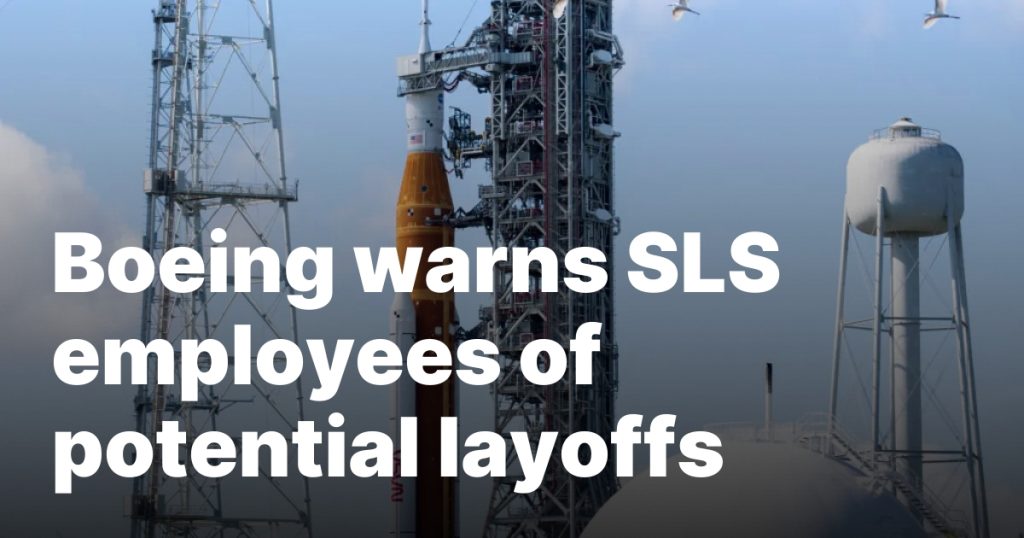WASHINGTON — Boeing has notified employees working on the Space Launch System program that up to 400 of them could lose their jobs as the new administration considers canceling the program.
Boeing SLS employees were informed Feb. 7 that the company was making preparations to cut up to 400 jobs from the program because of “revisions to the Artemis program and cost expectations.” The specific positions being considered for elimination were not announced but would account for a significant fraction of the overall SLS workforce at the company.
“To align with revisions to the Artemis program and cost expectations, today we informed our Space Launch Systems team of the potential for approximately 400 fewer positions by April 2025,” a Boeing spokesperson told SpaceNews. “This will require 60-day notices of involuntary layoff be issued to impacted employees in coming weeks, in accordance with the Worker Adjustment and Retraining Notification Act.”
The Worker Adjustment and Retraining Notification (WARN) Act requires companies to give 60 days’ notice of facility closings or other mass layoffs. “We are working with our customer and seeking opportunities to redeploy employees across our company to minimize job losses and retain our talented teammates,” the spokesperson said. The planed layoffs were first reported by Bloomberg.
NASA has not announced any revisions to the Artemis program, and a panel of NASA and industry officials said at the SpaceCom conference Jan. 29 they were pressing ahead with preparations for the Artemis 2 mission, the first crewed SLS/Orion flight, scheduled for April 2026. They argued that the current architecture remains the fastest way to return humans to the moon.
However, the Trump administration is considering revisions to the architecture that include canceling key elements like SLS and Orion. Elon Musk, the SpaceX chief executive who is a close adviser to President Trump, has criticized the current approach to Artemis.
“Regarding space, the Artemis architecture is extremely inefficient, as it is a jobs-maximizing program, not a results-maximizing program,” he posted on social media Dec. 25. “Something entirely new is needed.”
SLS has been criticized since almost its beginning, derided by some critics as the “Senate Launch System” for its origins in a 2010 NASA authorization act that directed NASA to develop a heavy-lift rocket using shuttle-derived technologies as a way to reduce the impact of the retirement of the space shuttle and cancellation of the Constellation program.
SLS launched for the first time in 2022 on the Artemis 1 mission. “The flight vehicle was proved out on Artemis 1. It was a terrific mission,” said John Shannon, mission area vice president for Boeing Space Exploration, on the SpaceCom panel. There were few changes to the vehicle itself for Artemis 2, he said, but changes in how the vehicle was processed, with some work moved from the Michoud Assembly Facility to the Kennedy Space Center.
“This is our second one and there are a lot of lessons learned,” Dave Dutcher, Boeing SLS program manager, said in a July interview. “It’s a much cleaner vehicle throughout the build and test than the first one.”
SLS, though, remains a subject of criticism for its high costs and low flight rate. A report by NASA’s Office of Inspector General in August also found quality issues with Boeing’s work on the Exploration Upper Stage, a more powerful upper stage planned for the Block 1B version of SLS that will begin service on Artemis 4.
Any attempt to cancel SLS or make other radical changes to the Artemis architecture is likely to face opposition from some in Congress, as was the case in 2010 when the Obama administration sought to cancel the Constellation program, a process that led to the SLS. Notably, the vice-chair of the commerce, justice and science subcommittee of the House Appropriations Committee is Rep. Dale Strong (R-Ala.), whose district includes NASA’s Marshall Space Flight Center, the lead center for SLS.








